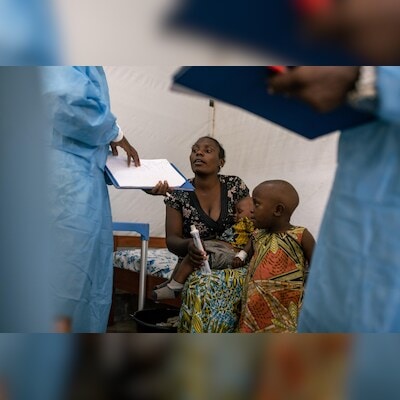Still, African nations failed to build up vaccine stocks even after agreeing on a plan to boost the continent’s emergency response capabilities | Photo: Bloomberg
By Janice Kew and Antony Sguazzin
Public health officials battling a deadly outbreak of mpox in Africa are scrambling to avoid life-threatening mistakes during the Covid-19 pandemic, starting with the slow procurement of vaccines.
In the week since the World Health Organization declared the spread of the potentially deadly disease a public health emergency of international concern, there has been constant talk of getting vaccines to African soil. They are now expected to arrive next week.
Crucially, plans are also in place to ensure that vaccines reach the arms of those vaccinated.
“This is about putting in place robust supply chain management that can accommodate the vaccine that we will be bringing in the next few days,” Africa Centers for Disease Control and Prevention Director-General Jean Kaseya said Tuesday.
Mpox has been present on the continent since the 1970s, with little international attention. But, although it is the only region where the disease is endemic, it did not receive vaccines against the virus in 2022, as the infectious disease spread around the world.
Something similar happened during the COVID-19 pandemic: when vaccines first became available, Africa found itself at the back of the queue.
Still, African nations have failed to build up vaccine stocks even after agreeing on a plan to improve the continent’s emergency response capabilities.
Part of that failure is related to the lack of local vaccine production. The region imports almost all of its vaccines and attempts to create a vaccine industry have failed. Kaseya is convinced that this time will be different.
“Without local production in Africa, we are exposed,” he said.
South African vaccine maker Biovac Institute will discuss with the Africa CDC how to transfer technology so the company can make mpox vaccines, said chief executive Morena Makhoana.
Africa CDC is in talks with Bavarian Nordic A/S, one of the few companies with an approved mpox vaccine, to obtain vaccines quickly while ensuring that manufacturers on the continent also have the capacity to fill vials with the vaccine made by the Danish company.
This would allow them to produce locally, lowering the price without compromising quality, Kaseya said in an online press conference.
The continent needs 10 million doses, but the vaccines are very expensive. At around $100 per dose, “many countries cannot afford to buy them at that price,” said Helen Rees, founder of the Reproductive Health and HIV Institute in Johannesburg.
Bavarian Nordic has said it will be able to meet the immunization needs of African nations. The problem has been a lack of orders: manufacturers will not produce large quantities of vaccines unless they have some kind of guaranteed market.
“As this is a global health threat, we need to find funding to subsidize vaccines in low- and middle-income countries where cases are being detected,” said Rees, who also chairs the WHO’s African Regional Technical Advisory Group on Immunization. African nations need to get their supplies now, before the threat spreads, he said.
“Unless the African region has access to all of these products that are required to respond to an emergency, we are going to be waiting in line forever,” Rees said.
Even if vaccines arrive, there won’t be enough for large-scale vaccination. The Africa CDC plans to prioritize high-risk populations and people who may come into contact with the disease through domestic or sexual networks.
While most of the spread in the eastern flank of the Democratic Republic of Congo is among children, some research suggests there is an almost entirely separate outbreak among adults, many of them women who identify as sex workers.
“We need people to accept the vaccine,” Kaseya said. “If we stop this outbreak in Africa today, we will be saving lives” in other parts of the world as well.
First published: August 21, 2024 | 8:14 a.m. IS
Disclaimer:
The information contained in this post is for general information purposes only. We make no representations or warranties of any kind, express or implied, about the completeness, accuracy, reliability, suitability or availability with respect to the website or the information, products, services, or related graphics contained on the post for any purpose.
We respect the intellectual property rights of content creators. If you are the owner of any material featured on our website and have concerns about its use, please contact us. We are committed to addressing any copyright issues promptly and will remove any material within 2 days of receiving a request from the rightful owner.

